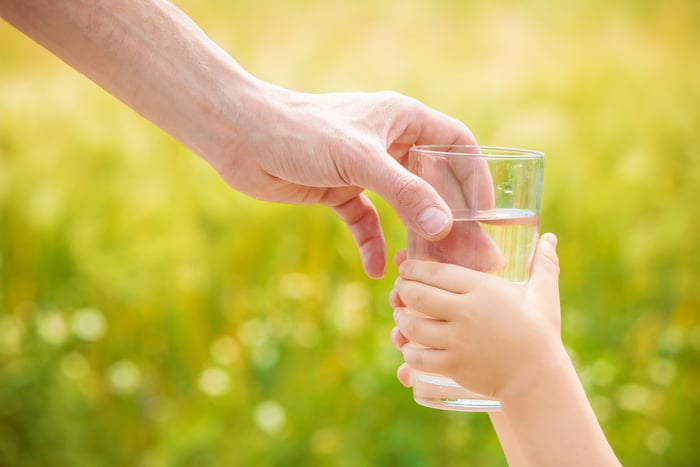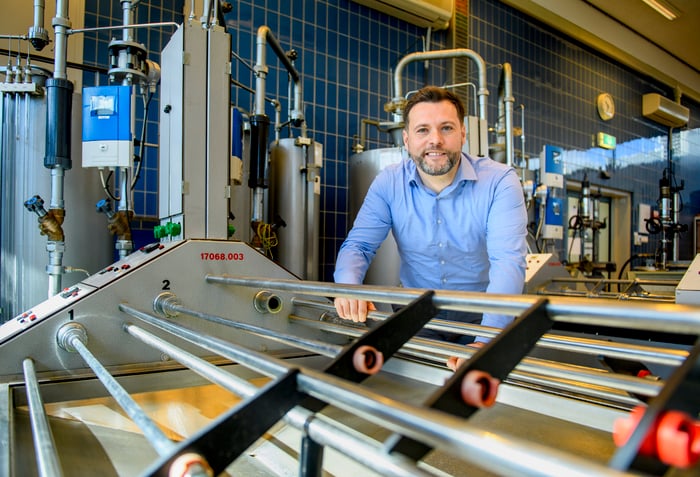Accelerating progress towards universal access to safe water and sanitation

Water is one of the world’s most precious resources: it is one of our fundamental needs, not only for drinking but also for sanitation. Despite water covering about 71 percent of the earth’s surface, only about 1 percent of it is usable freshwater. And after decades of misuse, including pollution, contamination and overextraction, we are now facing water shortages around the world.
To tackle this, in 2015 the UN set Sustainable Development Goal (SDG) 6: Ensure access to water and sanitation for all. Although access to safely managed drinking water services has improved – from 70 percent of the world’s population in 2015 to 74 percent in 2020 – 1.2 billion people still lack access to safe water.
According to the UN, “Right now, we are seriously off-track.” As the latest data shows, governments will need to work four times faster to achieve SDG 6 and ensure everyone has access to clean water and sanitation by 2030.
Sanitation is one of the most important aspects of community well-being because it protects human health, extends life spans, and safeguards the environment – including water bodies that are sources of drinking water
World Water Day – 22 March 2023 – aims to encourage everyone to take action, collectively as well as individually. It’s time for everyone to contribute in the best way they can, and for Kiwa that means helping to improve water efficiency, safeguarding supply by detecting leakages, ensuring water quality, and supporting waste treatment.

Innovation drives safe water and sanitation
Given the relative scarcity of drinking water worldwide, water engineering has been a feature of human civilization for millennia: people dug the first permanent water wells more than 8,500 years ago, and more than 3,000 years ago people were reusing domestic wastewater for irrigation.
Our water supply relies on engineering innovations now more than ever before. We use technology to build reservoirs and dams, monitor, protect and extract groundwater, build irrigation systems, construct supply infrastructure, treat wastewater, and derive energy from the tides.
Technology continues to evolve, resulting in more solutions to water supply and sanitation. “The race for the adoption of different affordable and effective technological solutions that can improve the quality of sanitation is well on the way in the water sector,” Dragan said.
The focus is on innovative solutions designed to contain and transform sanitation products, such as user interface, conveyance, storage, treatment and final disposal or reuse. And a major consideration is the impact of these innovations.
“Sustainability and digitalization topics drive innovation in this field,” Dragan added. “Smart water management can help reduce water, energy, and greenhouse gas emissions while supporting business in achieving their performance and SDG goals.”

Kiwa’s role in accelerating progress towards SDG 6
Kiwa has long been involved in water as an independent third party; it’s even part of Kiwa’s corporate identity, as Dragan explained: “If you look at our logo, you’ll see a beaver, which represents a number of things. Beavers are commonly found in a natural, healthy, clean water environment; many of the services we provide are to ensure safe and clean water. Beavers bring progress in nature, and are steady, friendly and hard-working creatures, just like people at Kiwa.”
Today, Kiwa is an independent third party that tests, inspects and certifies water and sanitation products. In this way, Kiwa contributes to a safer, more efficient water supply and more reliable sanitation, thereby also working towards SDG 6.
As a partner for progress, Kiwa works closely with companies throughout the water supply and sanitation chain, helping those clients contribute to a more sustainable future too. Kiwa is working to develop a number of services that will help our customer make their efforts in this field visible and in this way contribute to SDG 6, including water use and efficiency services, sensors to monitor water quality, leakage detection systems, and services related to drinking water, waste treatment and collection, and tracking and sorting recyclables.
At a corporate level, Kiwa is also focusing on its own impacts on sustainable development, with a CSR strategy – Kiwa's CSR Route 2025 – that holds Kiwa to the requirements of the CSR Performance Ladder.
“A major factor in being able to achieve SDG 6 will be the capacity of the world's organizations and institutions to come together in partnerships and cooperation to accelerate progress,” Dragan said. “It’s is a collective approach that needs more action from all stakeholders and requires strong local commitments from everyone, especially those with decision-making power.”
Stories from around the world
Would you like to know how our Kiwa colleagues use their expertise to help shape a better, more sustainable and fair world?
